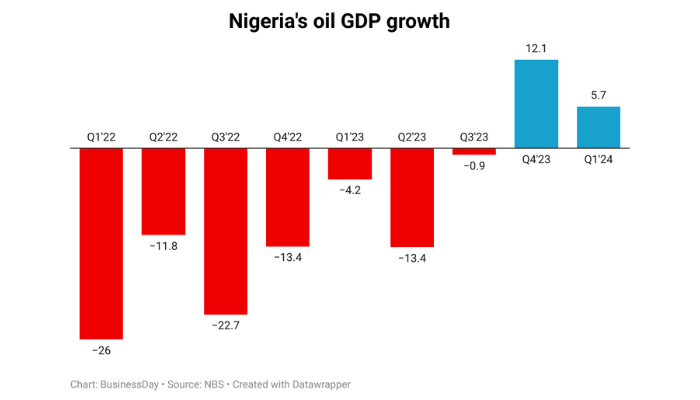Nigeria, Africa’s largest oil producer, faces a significant setback as its oil Gross Domestic Product (GDP) growth slows to 5.7 percent in the first quarter of 2024.
Nigeria relies on oil production for about two-thirds of government earnings and 90% of its foreign exchange income.
The latest data from the Nigerian National Bureau of Statistics (NBS) revealed Nigeria’s oil sector’s GDP growth slowed to 5.7percent in the first quarter of 2024, down from 12.1 percent recorded in previous quarter.
Further findings showed crude petroleum GDP dipped from 6.41 percent in the fourth quarter of 2023 to 5.70 percent in Q1 2024.
The nation in the first quarter of 2024 recorded an average daily oil production of 1.57 million barrels per day (bpd), higher than the daily average production of 1.51 million bpd recorded in the same quarter of 2023 by 0.06 million barrels per day.
Read also: FG to partner Schlumberger on innovative technologies to boost oil production
It is also higher than the fourth quarter of 2024 production volume of 1.55 million barrels per day by 0.02 million bpd.
“Why should a country like Nigeria which has been producing oil, exporting oil for the past 70 years not have a scientific way of metering, recording what leaves, what is pumped, what is sold and what is not sold? And it’s deliberate,” Seriake Dickson, representing Bayelsa West in the National Assembly, said on Channels Television.
“People from Abuja and Lagos are the masterminds and the official system is not ignorant and not innocent. The official security system, the official oil system, the official federal system, all of it in its entirety,” he added.
Dickson, a two-term governor of Bayelsa State in the South-South geopolitical zone of Nigeria, alleged that the official system and some oil companies are beneficiaries of oil theft in the Niger Delta.
Large-scale oil theft from pipelines and wells has been one of President Bola Tinubu’s biggest challenges in recent years, damaging government finances and limiting the country’s output and exports.
At the current price of $82 per barrel, Nigeria earned additional revenue of $5 per barrel, whereas the country’s 2024 budget was based on 1.78 million barrels per day (bpd) and $77.96 per barrel.
Despite these increased earnings, Nigeria has struggled to raise output as theft and sabotage have forced oil majors including Shell and ExxonMobil to exit all their onshore assets.
“The easiest and earliest way to get out of this foreign exchange problem is to increase oil production,” said Festus Osifo, president of the Petroleum and Natural Gas Senior Staff Association of Nigeria.
Read also: SLB Nigeria, EnServ partner to deliver services to oil and gas industry
“We appeal to the government of President Tinubu to relocate the military commanders to the Niger Delta region (where Nigeria’s oil is produced) to ensure that this menace of oil theft is put to a halt, and we will be able to generate more revenues at the end of the day,” Osifo said in a statement seen by BusinessDay.
Apart from oil production, Nigeria is also struggling to find buyers for its crude oil due to a shortfall in demand from Europe.
About 20 to 25 shipments of Nigerian crude for April loading are still seeking buyers, according to four traders specialising in the West African market.
The traders said it is a considerably weaker position than normal for this time of the month — when trade should be moving on to May’s barrels — and the prices the shipments can fetch are plummeting.
